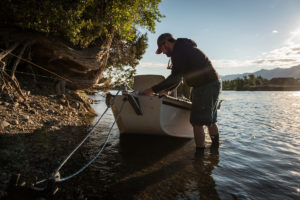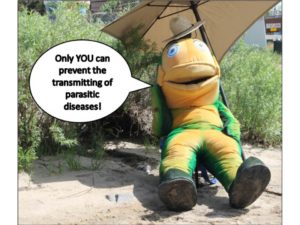In response to a parasitic disease that caused an unprecedented fish kill, on August 19, Montana Fish, Wildlife and Parks (FWP) closed 183 miles of the Yellowstone River and all its tributaries. The closure stretches from Yellowstone National Park's North Boundary to Laurel, Montana. "This action is necessary to protect the fishery and the economy it sustain," said Montana FWP in a press release. "The closure will also help limit the spread of the parasite to adjacent rivers through boats, tubes, waders and other human contact and minimize further mortality in all fish species.
"In the past week, FWP has documented over 2,000 dead Mountain Whitefish on some affected stretches of the Yellowstone. With that, FWP estimates the total impact to Mountain Whitefish in the Yellowstone to be in the tens of thousands. FWP has also recently received reports of the kill beginning to affect some Rainbow and Yellowstone Cutthroat Trout."
In order to help the Yellowstone rebound and keep other fisheries throughout the west healthy, it's important to remind anglers to effectively clean their gear. Colorado anglers know all to well with Whirling Disease how these parasites can affect a fishery, economy and community so it's worth the time to clean gear properly. "Few of us want to spend time cleaning rafts and fishing gear at the end of a long day on the river. But, this outbreak is a great reminder that those efforts are the least we can do to protect the resources we love," said Brooks.
 It is believed that the parasite causing the fish kill was introduced to the river by people and FWP along with Montana TU and its chapters are urging people to keep their gear cleaned. "Now that the parasite (Tetracapsuloides bryosalmonae) is in the Yellowstone and infecting fish, the main priority is eliminating additional stressors on those fish and preventing it from spreading to other rivers," said David Brooks, Montana TU Associate Director of Conservation. "Our MTU chapters in the Yellowstone area are coordinating volunteers to be stationed at river access points to let folks know that the river is closed and to educate people about the reason. More importantly we are using those encounters and all of our social media presence to talk about cleaning and drying boats and gear properly."
It is believed that the parasite causing the fish kill was introduced to the river by people and FWP along with Montana TU and its chapters are urging people to keep their gear cleaned. "Now that the parasite (Tetracapsuloides bryosalmonae) is in the Yellowstone and infecting fish, the main priority is eliminating additional stressors on those fish and preventing it from spreading to other rivers," said David Brooks, Montana TU Associate Director of Conservation. "Our MTU chapters in the Yellowstone area are coordinating volunteers to be stationed at river access points to let folks know that the river is closed and to educate people about the reason. More importantly we are using those encounters and all of our social media presence to talk about cleaning and drying boats and gear properly."
Colorado Parks and Wildlife has an Angler Cleaning card to remind everyone of the safest and most efficient ways to clean gear. These options include:
- Clean gear with a mixture of ammonia based cleaner and water
- Spray or soak gear with water of at least 140 degrees
- Dry waders and gear for a minimum of 10 days.
- Place boots and waders in a freezer overnight.
The parasite in the Yellowstone is believed to cause prolific kidney disease in trout. It does not pose any issues to humans or pets. According to the Bozeman Daily Chronicle, the parasite was first discovered in 2011 has been seen and related to fish kills in Washington, Oregon, Idaho, Canada and Europe.
The parasite is picked up through the gills and travels to the kidneys. "The sudden and large death toll in whitefish indicates that they have not been exposed to the parasite before," said Brooks. "The good news is that surviving fish that have been exposed - whitefish and trout - will develop pretty robust immunity. The bad news is, this incident shows that the parasite travels with people and our stuff."

It only takes one person to transmit a parasite similar to the one found in Yellowstone. Maybe one day the angling community will have a "Smokey Bear" figure that tells people "Only YOU can prevent the transmitting of parasitic diseases" but until that day, it's up to the angling community to share among ourselves.


